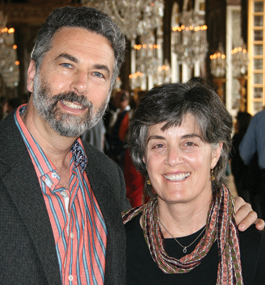A Lengthy Courtship
Husband and wife attorneys Michael Bien ’77 and Jane Kahn ’77 make prisoners' civil rights historic case

Michael Bien '77 and Jane Kahn '77
by David Nathan
Not long ago, during a court hearing in the California prison mental-health case that they have litigated for nearly two decades, the district court judge addressed husband-and-wife attorneys Michael Bien ’77 and Jane Kahn ’77.
“You know that this case is old enough to drive, and almost old enough to vote and to drink?” he said with a smile.
Bien and Kahn have spent more than half of their professional lives working with a team of lawyers on an epic case now called Coleman v. Schwarzenegger. The class-action civil rights lawsuit, which was filed in 1990 and went to trial in 1993, alleges that California denies fundamental constitutional rights to prisoners with serious mental illness. When Bien and Kahn first filed the case, defendant Arnold Schwarzenegger had not yet left Hollywood for the California governor’s mansion.
Among the plethora of ills the pair are working to eliminate are “triple bunks, possessions in paper bags, raw sewage, and prisoners lined up in the halls in cages waiting to go from place to place,” says Kahn. “Going inside these prisons is torture.”
In 1995, the federal court found in favor of the mentally ill prisoners and appointed a special master to oversee improvements. After years of delay and little progress, the plaintiffs joined in 2006 with a related California prisoner class-action case involving medical care. In August 2009, a three-judge federal panel in San Francisco issued a landmark ruling that overcrowding in California’s prisons was the primary cause of the system’s constitutionally deficient medical and mental-health care, and ordered the inmate population reduced by about 40,000 prisoners. The state has appealed the order to the U.S. Supreme Court, which is hearing arguments this fall.
The case has received national attention. Bien and Kahn have been quoted in The New York Times and other major newspapers, interviewed by National Public Radio, and invited to speak at law schools and conferences. Kahn was also featured in a major Human Rights Watch report on the treatment of the mentally ill in U.S. prisons, while Bien received the California Lawyer of the Year Award for constitutional law from California Lawyer magazine and a lifetime Public Service Award from Northwestern University School of Law, his alma mater.
“The case has been both very rewarding and very frustrating,” Bien says. “When we step back, we see that we are on the verge of achieving historic change in the system by reducing extreme levels of overcrowding, but it’s still distressing to see the conditions the inmates are living in.”
Bien and Kahn say their interest in pursuing social justice was nurtured at Brandeis, where they met as freshmen. Bien majored in history and American studies while Kahn pursued American studies.
“The kind of perspective on American political and social history we gained at Brandeis contributed to our view that there was a need for social change and action,” Bien says. “That’s why we ended up not only as lawyers, but lawyers for social change.”
